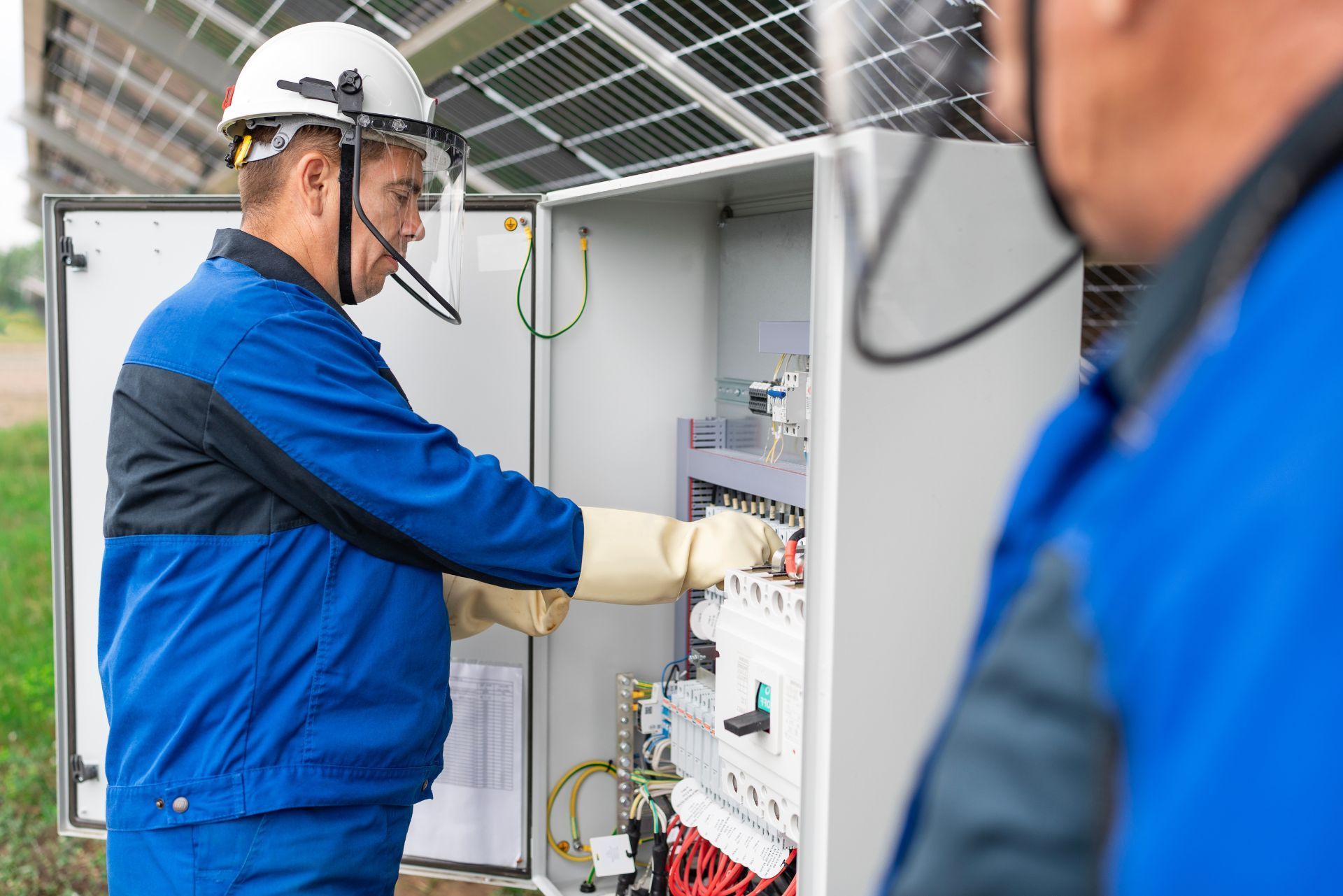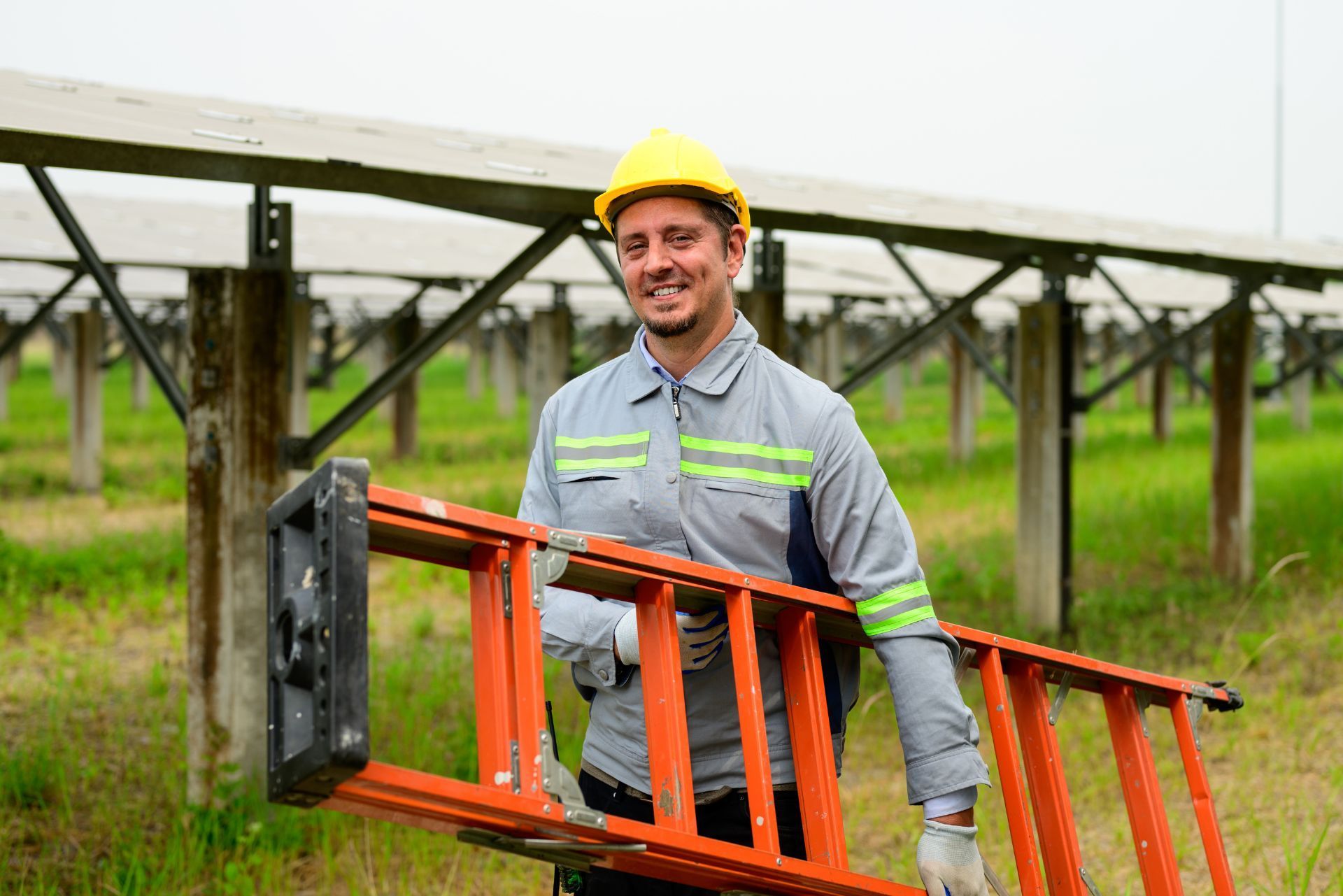Index
Understnding the Risks Faced by Agricultural Electricians
Why Specialized Insurance is Crucial for Agricultural Electricians
How Insurers Assess and Price Agricultural Electrician Risks
The Growing Demand for Agricultural Electrician Services
Key Considerations When Choosing Agricultural Electrician Insurance
Conclusion: Protecting Agricultural Electricians Through Informed Insurance Choices
Contact Us
Phone
Location
Simi Valley, CA 93065
The Woodlands, TX 77382
Katy, TX 77494
Working as an electrician in the agricultural sector presents a unique set of challenges and risks. From wiring expansive farm facilities to maintaining electrical systems for heavy machinery, agricultural electricians play a critical role in keeping farms operational and safe. However, this line of work also exposes them to hazards that can lead to injuries or costly damages. Understanding the importance of specialized insurance coverage is essential for protecting both the electrician and the agricultural businesses they serve.
With the agricultural industry facing significant injury rates and evolving risk factors, tailored insurance solutions are more important than ever. This article explores the nuances of agricultural electrician insurance, including the risks involved, industry trends, and how insurers are leveraging technology to better assess and price these risks. Whether you are an electrician working on farms or a farm owner seeking to understand insurance options, this guide offers comprehensive insights to help you navigate this complex landscape.
Understanding the Risks Faced by Agricultural Electricians
Agricultural electricians operate in environments that are often more hazardous than typical residential or commercial settings. Farms and ranches involve heavy machinery, large electrical systems, and exposure to outdoor elements, all of which contribute to a higher risk of injury.
Statistics highlight the severity of these risks. For instance, the injury rate for self-employed farmers and ranchers is 15.25 injuries per 100 operators, leading to an estimated national agricultural injury cost of $11.31 billion annually. While this statistic focuses on farmers, electricians working closely with farm operations share exposure to many of the same hazards, such as electrical shocks, falls, and equipment-related accidents.
Given these risks, agricultural electricians require insurance policies that cover a broad spectrum of potential incidents, including bodily injury, property damage, and equipment failure. Without adequate coverage, the financial consequences of accidents can be devastating for both electricians and farm owners.
Moreover, the nature of agricultural work often necessitates long hours and irregular schedules, which can lead to fatigue and decreased attention to safety protocols. This is particularly concerning when electricians are required to work in adverse weather conditions, such as rain or extreme heat, where the risk of accidents can increase significantly. The combination of physical strain and environmental factors can create a perfect storm for potential mishaps, making it imperative for agricultural electricians to remain vigilant and prioritize safety at all times.
Training and continuous education play a crucial role in mitigating these risks. Many agricultural electricians participate in specialized programs that focus on the unique challenges of working in agricultural settings. These programs often cover essential topics such as safe machinery operation, electrical safety standards, and emergency response procedures. By staying informed and well-trained, electricians can not only protect themselves but also contribute to a safer working environment for everyone involved in agricultural operations.
For more detailed information on agricultural injury statistics, the American Journal of Industrial Medicine provides a comprehensive study on this topic.

Why Specialized Insurance is Crucial for Agricultural Electricians
Standard electrician insurance policies may not fully address the specific risks associated with agricultural environments. Farms often have unique electrical systems, including irrigation controls, grain dryers, and livestock facilities, which require specialized knowledge and coverage. The complexity of these systems means that agricultural electricians must be well-versed in both electrical standards and agricultural practices, making their role critical in ensuring safety and efficiency on farms.
Insurance tailored for agricultural electricians typically includes coverage for:
- General liability to protect against third-party injuries or property damage
- Equipment and tool coverage to safeguard expensive electrical equipment
- Workers’ compensation for injuries sustained on the job
- Commercial auto insurance for vehicles used on farms
- Pollution liability, especially relevant when working with chemical storage or waste systems
Such comprehensive coverage ensures that agricultural electricians can operate with confidence, knowing that their business and livelihood are protected against the unique hazards they face daily. Additionally, the unpredictable nature of farming, including weather-related challenges and fluctuating market demands, can further complicate the landscape for agricultural electricians. This makes it even more essential for them to have insurance that not only covers physical risks but also provides financial stability during tough times.
The Role of Small Businesses in the Electrical Industry
It's important to note that 80% of electrical contractors are small businesses with fewer than 10 employees. Many agricultural electricians fall into this category, making insurance even more critical. Small businesses often have limited financial reserves, so a single claim or accident can severely impact their operations. Furthermore, small businesses contribute significantly to local economies, providing jobs and supporting community initiatives, which emphasizes the need for robust insurance coverage to ensure their sustainability.
On average, electrician businesses generate about $1.1 million in annual revenue, underscoring the economic significance of protecting these enterprises through appropriate insurance policies. The financial implications of inadequate coverage can be dire; a single incident could lead to costly repairs or legal fees that a small business might struggle to absorb. Moreover, as agricultural technology evolves, electricians must stay updated on the latest innovations, which can require additional investments in training and equipment. This highlights the importance of having insurance that not only covers current liabilities but also supports future growth and adaptation in a rapidly changing industry.
For insights into the structure of the electrician industry, the
GITNUX industry report offers valuable data and trends. Understanding these dynamics can help agricultural electricians make informed decisions about their business practices and insurance needs, ensuring they remain competitive and secure in a challenging environment.
How Insurers Assess and Price Agricultural Electrician Risks
Insurance companies have been early adopters of artificial intelligence (AI) and data analytics, especially in underwriting and pricing farm accounts. This technological advancement allows insurers to more accurately evaluate the risks associated with agricultural electricians and tailor policies accordingly.
Modern insurers utilize remote sensing technology, satellite imagery, and AI-driven data analysis to monitor farm conditions and predict potential hazards. This approach not only improves risk assessment but also helps in setting fair premiums that reflect the true risk profile of each client. By analyzing vast amounts of data, insurers can identify patterns that may not be immediately apparent, such as seasonal weather changes or soil conditions that could impact electrical installations on farms.
According to the Insurance Journal, insurers are increasingly integrating these technologies to enhance their underwriting processes, making insurance more responsive to the dynamic nature of agricultural work. This shift not only benefits insurers but also empowers agricultural electricians with insights that can help them manage their risks more effectively.
Benefits of Technology-Driven Insurance Pricing
By leveraging AI and data analytics, insurers can identify risk factors unique to agricultural electricians, such as the types of equipment used, geographic location, and historical injury data. This allows for more personalized coverage options and can lead to cost savings for insured electricians who maintain safe practices. For instance, electricians who invest in safety training and equipment may qualify for discounts, incentivizing them to uphold high safety standards.
Additionally, technology enables quicker claims processing and better fraud detection, which benefits both insurers and policyholders by fostering trust and efficiency in the insurance process. The use of machine learning algorithms can flag unusual claims patterns for further investigation, reducing the likelihood of fraudulent activities that can drive up costs for all policyholders. Furthermore, real-time data collection allows for proactive risk management, enabling electricians to address potential issues before they escalate into costly claims. This proactive approach not only enhances safety on the job but also contributes to a more sustainable agricultural sector by minimizing disruptions caused by electrical failures.
The Growing Demand for Agricultural Electrician Services
The electrician industry in the United States is robust and expanding. With a market size of $199.3 billion in 2021 and an average annual revenue growth of 1.9% between 2016 and 2021, demand for skilled electricians continues to rise. The sector is projected to grow at an annualized rate of 1.4%, reaching approximately $213.7 billion by 2026.
Electricians specializing in agricultural work are positioned to benefit from this growth, as farms increasingly rely on advanced electrical systems to improve efficiency and productivity. The median annual wage for electricians was $62,350 in May 2024, with employment projected to grow by 9% from 2024 to 2034, reflecting strong job prospects in this field.
For more employment and wage statistics, the U.S. Bureau of Labor Statistics provides detailed occupational data.
Implications for Insurance Needs
As the agricultural electrician workforce grows, so does the need for comprehensive insurance solutions tailored to this niche. New entrants to the field must understand the importance of securing appropriate coverage early in their careers to mitigate financial risks associated with workplace injuries or property damage.
Moreover, established agricultural electricians should regularly review their insurance policies to ensure they keep pace with industry changes, technological advancements, and evolving farm operations. As farms adopt more sophisticated technologies such as automated irrigation systems, climate control solutions, and renewable energy sources like solar panels, the complexity of electrical systems increases. This complexity not only heightens the potential for electrical failures but also necessitates a deeper understanding of safety protocols and compliance with regulations. Therefore, electricians must stay informed about the latest industry standards and best practices, which can directly influence their insurance needs and liabilities.
Additionally, the integration of smart farming technologies is reshaping the landscape of agricultural electrical work. With the rise of Internet of Things (IoT) devices, farmers are now able to monitor and control various aspects of their operations remotely, from soil moisture levels to livestock health. This shift not only opens new avenues for electricians to install and maintain these systems but also emphasizes the need for specialized training in both electrical work and technology. As a result, electricians who invest in ongoing education and skill development will find themselves in a prime position to meet the demands of modern agriculture, further solidifying their role in this essential industry.

Key Considerations When Choosing Agricultural Electrician Insurance
Selecting the right insurance policy involves careful evaluation of coverage options, risk factors, and cost. Here are some essential considerations for agricultural electricians and farm owners:
- Coverage Scope: Ensure the policy covers all relevant risks, including liability, equipment, workers’ compensation, and vehicle use.
- Customization: Look for insurers that offer tailored policies reflecting the specific needs of agricultural electricians rather than generic electrician insurance.
- Claims Support: Choose companies known for efficient claims handling and customer service.
- Technology Integration: Consider insurers that use AI and data analytics to provide accurate risk assessments and potentially lower premiums.
- Cost vs. Value: Balance premium costs with the extent of coverage to ensure adequate protection without overpaying.
Working with an insurance broker experienced in agricultural and electrical industries can help navigate these options and secure the best policy.
Additionally, it’s crucial to keep abreast of industry trends and changes in regulations that may affect insurance needs. For instance, advancements in agricultural technology, such as precision farming and automated machinery, can introduce new risks that may not be covered under traditional policies. Electricians working in agriculture should ensure their insurance reflects these evolving challenges and provides adequate protection against potential liabilities associated with new technologies.
Furthermore, consider the importance of risk management practices within your operations. Implementing safety protocols, regular equipment maintenance, and employee training can not only reduce the likelihood of incidents but may also lead to lower insurance premiums. Insurers often reward proactive risk management with discounts, making it a win-win for both the business and the insurance provider. By fostering a culture of safety and compliance, agricultural electricians can enhance their operational efficiency while securing favorable insurance terms.
Conclusion: Protecting Agricultural Electricians Through Informed Insurance Choices
The role of agricultural electricians is vital to the success and safety of modern farming operations. Given the high injury rates in agriculture and the complex electrical systems involved, specialized insurance coverage is indispensable.
By understanding the unique risks, industry trends, and technological advancements in insurance underwriting, agricultural electricians and farm owners can make informed decisions to protect their businesses and livelihoods. Embracing tailored insurance solutions not only mitigates financial risks but also supports the continued growth and sustainability of this essential sector.
For further insights into how insurers are evolving to meet agricultural needs, the Insurance Journal provides an in-depth look at the integration of AI and data analytics in farm insurance underwriting.
Types of Electrician Insurance We Provide
Areas we serve




